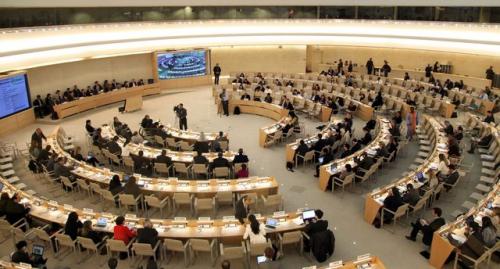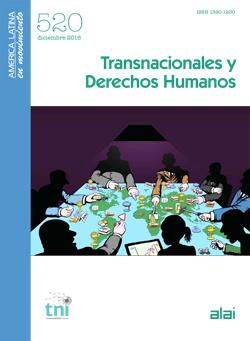Toward the construction of a binding instrument
Resolution 26/9, presented by Ecuador and South Africa, is a turning-point in the evolution of international human rights norms, since it has opened the way to advance in the task of filling significant voids in international human rights law.
- Opinión

| Article published in ALAI’s magazine No. 520: Transnacionales y Derechos Humanos 08/12/2016 |
Under the auspices of Ecuador and South Africa, on June 26, 2014 the Human Rights Council (HRC) adopted the resolution A/HRC/RES/26/9 (26/9) “Elaboration of an international legally binding instrument on transnational corporations and other enterprises with respect to human rights”. The resolution also called for the establishment of an open-ended intergovernmental working group to carry out the task. The first session of the Working Group took place in July 2015, and Ecuador was elected to preside over the group. On March 11, 2016 the Ecuadorean Ambassador, elected as Chair-Rapporteur, presented the report of the first Session, in the framework of the 31st Session of the Council of Human Rights in March 2016[1].
Greater support was noted, from States and social organisations, for the elaboration of the aforementioned international instrument, in the Second Session of the Working Group on transnational corporations and human rights that took place in the United Nations in Geneva, from October 24 to 28, 2016, in fulfilment of Resolution 26/9 approved by the Human Rights Council.
Contrary to the first session, this time the European Union participated, in line with the Resolution of the European Parliament, according to which the member countries were to participate constructively in the negotiations. Various European NGOs expressed their satisfaction with the presence of the European Union, indicating that they should be in the meeting room.
This growing support was produced, in part, as the result of an intense effort of consultations, activities and events, not only in Geneva, but also in other cities across the World, undertaken by the Chair of the Working Group. In these dialogues representatives of States, parliaments, multilateral bodies and social organizations took part. This has allowed for an interchange of criteria, which has both facilitated a definition of points that require further discussion, as well as creating favourable atmosphere for dialogue that was evident in the Second Session, in which the countries expressed their confidence in the Chair to renew her mandate.
The voices of social organizations and of civil society deserve special mention, many of them united under the Treaty Alliance, made up of over 1000 organizations and social movements from the whole World, whose members have repeated in different continents their support for the elaboration of a binding instrument and the fulfilment of the mandate of the Council of Human Rights.
Without a doubt, resolution 26/9, presented by Ecuador and South Africa, is a turning-point in the evolution of international human rights norms, since it has opened the way to advance in the task of filling significant voids in international human rights law.
According to the data of the United Nations Conference on Trade and Development (UNCTAD), around eighty per cent of goods are produced in remote locations, through chains of production located in different territorial jurisdictions. It is therefore important that human rights have a central role in this complex structure based on general and universal rules, the fulfilment of which provides security in benefit of all: of States, companies and above all, of human beings who could run the risk of their rights being diminished by unjustified actions.
As I pointed out in the inaugural speech, we maintain our view with respect to an international instrument that is legally binding and is destined to become the ideal tool to fix clear and universal rules on the operations of transnational companies. These would be applied in equality of conditions, in a predictable context, through an international framework for the fulfilment of human rights, which would allow for bringing justice and reparation for those who have been affected by inadequate business practices.
As Alfred de Zayas, Independent Expert of the United Nations for the Promotion of an International Democratic Order pointed out in his intervention, the self-regulation and voluntary principals with which transnational companies can guide themselves have a limit, and hence binding norms are required, with national and international controls. Zayas recalled that in his 2016 report to the Council on Human Rights, he recommended that States should cooperate with the working group that establishes a binding instrument that should be adopted freely, taking as a base the Ruling Principles of Negotiations and Human Rights, defining the monitoring mechanisms, demands and reparation for victims of abuses committed by transnationals.
On the other hand, it is evident that an asymmetry of power exists, where transnationals can accede to mechanisms for regulating differences and suing States, while, neither States nor communities have international mechanisms to ensure the fulfilment of human rights, access to justice and reparations.
One of the principal concerns that will be addressed by this instrument is precisely the issue of access to justice for the victims of human rights violations committed by transnational companies. During this session, the African Group pointed out, for example, that the violations of human rights, in areas such as environmental degradation, the elimination of toxic waste and the use of infantile labour by transnationals, disproportionately impact marginal and impoverished groups, a fact which exacerbates the existing preoccupations on human rights in that continent.
We are now in the process of preparation for the Third Session of the Working Group, to take place in 2017, in which we should present a proposal to be submitted to States and begin the process of negotiation.
One of the main axes of Ecuadorian foreign policy is to achieve a new treaty on transnational companies and human rights, for which active international participation has been defined. The President of Ecuador, Rafael Correa, made a call to States to participate in the elaboration of a binding instrument in the General Assembly of the United Nations in 2015. At the same time, the Minister of Foreign Affairs and Human Mobility, Guillaume Long, reiterated this call in the declarations of the Ibero-American Summit, of the Non-aligned Movement, of MERCOSUR and of the OAS. A workshop on the theme is also being planned in UNASUR.
Perhaps one of the main contributions to this process was produced in the First Regional Workshop on the binding instrument, held in Quito on October 6th and 7th, in which 15 countries from the region and 17 national institutions participated, as well as the contribution of international experts.
Meanwhile, in Ecuador, the Foreign Ministry has formed the Inter-institutional Roundtable, that brings together 17 State institutions, in which aspects have been analysed and proposed for consideration in the future binding instrument. There was also a first meeting with social organizations to discuss the scope of the binding instrument, a task that will continue in the preparation for the Third Session of the Working Group in 2017.
The route to follow
During the week of work in the The Human Rights and Alliance of Civilizations Room of the Wilson Palace at the United Nations in Geneva, six panels took place with more than 30 experts, which were enriched with the interventions of States and the contributions of civil society and other actors. Participants included 80 States, the European Union, The Holy See, the State of Palestine, the Council of Europe, the Red Cross, the International Labour Organization, the United Nations Conference on Trade and Development (UNCTAD), the United Nations Environment Programme and the South Centre; and 40 NGOs in consultative status with the UN.
All of the contributions, elements and reflections of the working week, as well as written contributions, will allow for the consideration of approaches and themes to comply with the mandate of the Human Rights Council. With these elements, a project of a legally binding international instrument will be elaborated, beginning with the Third Session of the Working Group, to be held in 2017.
The work report is a demonstration that the labour of this Working Group has gained in force, in content, in political weight and in participation. A vigorous process is underway, with the clear objective of fulfilling the mandate of the 26/9 Resolution. From the exercise of the Presidency, we note that more and more voices, more sectors aspire to establish equilibrium and clarity in the relation between transnational companies and their obligations and responsibilities with respect to human rights. In addition, this is a necessary and timely process to fill a serious vacuum in international human rights norms. But, above all, this is a process that seeks, on the one hand, to serve as a preventive tool and on the other, for the victims of corporate abuse to have a general legal tool to defend their rights and obtain reparations.
It is important to note that the following inter-sessional period will be much more active and intense, since it will demand multiplying the consultations and dialogue to guarantee the informed and deliberative participation of all the actors, the political will and the decision to advance.
As I pointed out in my closing message of the Session, as Chair of the working group, we must take advantage of this historic opportunity to achieve an international regulatory framework on human rights for transnational companies, that will establish clear, predictable and universal rules that facilitate investments of quality, but above all, that we can count on specific parameters of general observance of human rights, so that neither the legal vacuum nor the lack of normative clarity can give rise to impunity in the case of human rights abuses committed by the corporate sector. It was clear in this work session that in this process we have a commitment to the victims and that the prevalence and supremacy of human rights over other interests should cease to be an aspiration, in order to become an obligation.
(Translated for ALAI by Jordan Bishop)
- María Fernanda Espinosa Garcés, Chair-Rapporteur of the Working Group of the United Nations on Transnational Corporations and Human Rights. Permanent representative of Ecuador at the UN-Geneva.
Article first published in Spanish in ALAI’s magazine América Latina en Movimiento: titled “Transnacionales y Derechos Humanos” (transnationals and human rights) December 2016.
Del mismo autor
- Toward the construction of a binding instrument 19/01/2017
- Avanza construcción de instrumento vinculante 16/12/2016

